Despite urgings from industry colleagues to avoid predicted controversy (especially when three political figures are called out for their well-known antisemitism by name), producer Darryl F Zanuck fought hard to bring Elia Kazan’s GENTLEMAN’S AGREEMENT (1947) to the big screen. With a love story mixed in, this film tackles the subject of American antisemitism as a cultural experience, much more directly than had been endeavored before. [Spoilers will follow]
Gregory Peck is Philip Schuyler Green, a highly respected writer who has come to New York with his mother (Anne Revere) and young son (Dean Stockwell) for a gig, writing a series on antisemitism. He meets his publisher’s niece Kathy (Dorothy McGuire), who originally suggested the idea, and soon the two fall for each other.
At first he struggles with his angle to cover this series. Following an honest conversation at the breakfast table with his son explaining what antisemitism is, his mom encourages him not to give up because it would be nice not to have to explain bigotry to each generation. It’s only after he thinks to contact his chum since childhood Captain David “Dave” Goldman (John Garfield) to get his point of view as a Jewish man, combined with feeling sympathy for his mom’s angina attack, that he realizes he can only truly understand another person’s pain by experiencing it for himself. He must become a Jew.
From here, he sets the wheels in motion to let it be known to everyone that he is Jewish by casually dropping that into the conversation at a staff meeting, where he is first introduced to the Fashion Editor Anne Dettrey (Celeste Holm). Only his boss, his mother, his son and his new love interest Kathy know the real truth. But that nugget of a lie spreads like wildfire. Moments after meeting his new secretary Mrs. Wales (June Havoc), she reveals that she too is Jewish. Later his son Tommy asks his dad if they’re Jewish because the gossip mill has even reached the school playground.
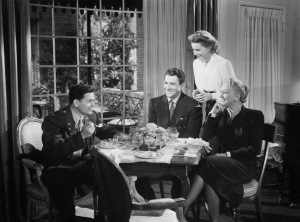
This film does a decent job of showing many examples of a wide range of antisemitism, from overt to subtle:
Mrs. Wales, the secretary: She displays internal prejudice with an air of superiority within her own ethnicity. She calls out “the sorts of Jews like us,” refering to other Jews as tacky and vulgar, and claims it’s okay for them to use the racist slur “kike” in a playful way.
The doctor: Racism apparently makes house calls. When the doctor (that Kathy recommended) cares for Phil’s mom, he refers another specialist to Phil. That specialist is Jewish, and the doctor slips in a few cracks about the “chosen people” before Phil points out that he too belongs to this same group.
At the restaurant: a drunk guy brushes past Dave, purposefully trying to antigonize him with a racial slur. This leads to Dave jumping up to his feet, ready to fight when the drunk guy’s friend intervenes, apologizing on his behalf.
At the honeymoon hotel: After becoming engaged, Phil and Kathy mention they have booked a hotel, the Flume Inn for their nuptials when Ann (Celeste Holm) points out that it’s restricted. This immediately sets Phil into action to discover for himself if they are willing to admit it to his face. When asked directly, the hotel clerk stammers and gets his manager. The manager won’t admit verbatim but he takes their confirmed reservation to suddenly being booked solid, refers them elsewhere and walks away.
Kathy: Here’s where we see the most dynamics of engrained, society-accepted racism. Kathy goes through a bumpy ride throughout the film in attempting to understand her own prejudices. She struggles with Phil at every turn. She asks Phil not to mention he’s Jewish at her sister’s party. When Dave announces he has to leave soon because he can’t find housing in order to accept the NY job offer, Phil argues with Kathy asking whey she can’t offer her empty cottage to him. She says it’s because that neighborhood would make him feel uncomfortable- she said there was a ‘gentleman’s agreement’ regarding Jews in that neighborhood.
Just as Phil gets angry at her insulting comments, Tommy interrupts. He’s visibly upset, saying he was bullied at school with slurs like “dirty Jew.” Kathy’s response is even more shocking, “Oh darling! It’s not true, it’s not true, it’s not true! It’s all a horrible mistake!” Phil shuts her down fast and takes Tommy to get cleaned up and chat. Tommy: “They wouldn’t fight. They just ran.” Phil shares that grownups do the same thing.
Kathy’s big debate with Phil comes when she reaches a breaking point. She’s tired of “always being wrong,” she hates what this secret has done to them, she hates him for doing this, and she’s glad she’s Christian, like a person is glad to be good looking, or rich vs. poor. (um, WOW.) Note: she takes no accountability herself.
Phil turns in his the first of his drafts to be published. He’s ready to reveal the truth. (At 8 weeks, instead of his originally planned 6 months.) It didn’t take nearly as long as predicted to have his entire world completely turned upside-down by this experiment in bigotry.
Phil’s Advocates:
Confident Anne (appealingly portrayed by Celeste Holm) is a quick-witted, easy-going liberal-thinker and already onboard with tolerance. She’s open-minded and comfortable when issues of antisemitism are addressed. She’s been a good friend and companion to Phil. She chats very candidly with him about Kathy. She calls her out as a hypocrite that’s afraid to fight these battles because it’s easier to have someone like Phil do their dirty work for them as they remain comfy in their gated communities. She goes further to say that people should raise their kids with someone who espouses their same values.
Yes, Anne is biased because she loves Phil. But I agree with every single point she makes. She IS the better match for him. More importantly, Kathy is not. So I’ll firmly argue that in the question of Kathy vs. Anne… Anne is the winner HANDS-DOWN.
John Garfield gives a terrific performance as Dave, the solid friend. He’s there for Phil no matter what, always honest and supportive. He agrees to meet Kathy after her mega blow-out with Phil. She shares that she attended a dinner party earlier that evening and “felt ill about it” when a racist joke was told. Dave asks what she actually did about it. Nothing, she admits. He urges her to understand that in a marriage Phil needs her to be there for him on the deeper issues, to fight. Speaking in his military uniform he says, “this is a different type of war.”
I honestly don’t know why this wasn’t already obvious to Kathy. Dave educates her that she can’t accept the “gentlman’s agreement” and she must not passively allow antisemitism to continue, she must speak up in order to earn Phil’s respect. Somehow Dave’s speech finally clicked for her.
Phil’s mom and son, Tommy: Mrs. Green is rightly proud of her son. She struggles with heart health but after reading her son’s initial draft on this antisemitism series, she is empowered. She gives a hopeful speech and announces she plans to be around for a long time to come. It’s clear he was raised by enlightened, tolerant parents. In turn, the simple kindness and wise-beyond-his-years morality shown by Tommy is a mirror of Phil’s parenting, as well. Scenes reflecting the bonding in these relationships between son and mother and between father and son are inspiring.
The film succeeds in addressing the social implications of antisemitism more deeply. Ultimately, I think it creates conversations and stirs up debate better than only focusing on overt examples of prejudice. This gets into the most likely bigotry going on in mainstream society.
I may not agree with Phil Green’s choice in love, but he’s a strong character as are his advocates. GENTLEMAN’S AGREEMENT (1947) speaks to me because while speaking out against injustice in any form is a passion for me, bigotry based on race, ethnicity or gender/sexual orientation is particularly puzzling to me. Shockingly in 2015 we still have a long way to go in solving this problem, so I find it interesting this subject was featured 68 years ago.
Made just a couple years after the end of WW2 and the Holocaust, the timing was ripe to bring awareness to antisemitism. Unfortunately, not everyone was interested in a more tolerant world as a life lesson to follow the horrific tragedies of that genocide. Director Elia Kazan was one of the first targets of the right-wing paranoia of the McCarthy witch hunts of the “Red Scare”.
Sucumbing to pressure to name communists within his industry to the House of Un-American Activities Committee, he folded. Like a house of cards in a Kansas twister. As a result, despite the huge success and Oscar wins of GENTLEMAN’S AGREEMENT, instead of making more films tackling issues of social injustice, Kazan went on to make very patriotic, pro-war propaganda films. It created a divide in Hollywood history that remains a hot issue.
Like Phil’s mother, I remain optimistic that we can still make changes to fight antisemitism and all areas of bigotry for the benefit of our future generations. It is our responsibility and our patriotic duty.
This piece is my contribution to the 1947 BLOGATHON hosted by Karen of Shadows & Satin and Kristen of Speakeasy. Explore their blogs for the recaps of all three days of the many, fascinating films of 1947.


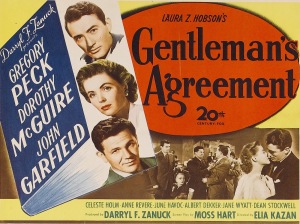
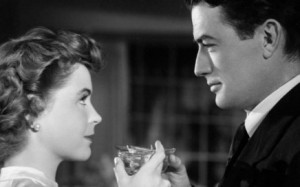
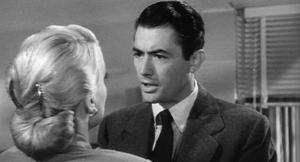

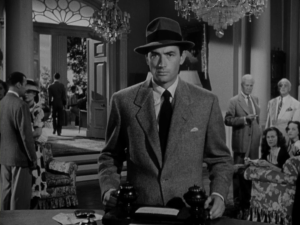

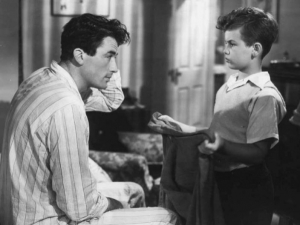
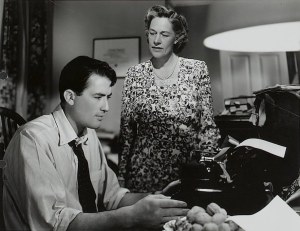
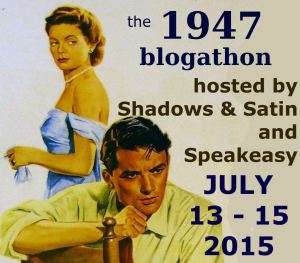
Excellent movie, which I confess I hadn’t seen until my wife enthusiastically egged me on to re-view it with her a few years ago. I agree, it’s amazing how much we still haven’t learned from it. Very thoughtful review!
LikeLike
Thanks, Steve! It’s a tough film to review because I believe it’s a very important film that deserves special attention.
LikeLike
Love this movie! Being Jewish myself, I too found it to be very eye opening and was actually very surprised that they dxont mention the Nazi or the Holocaust and still managed to make a very powerful, engaging and extremely important movie about tolerance.
great job Kellie!
LikeLiked by 1 person
Thanks SO much, Rob! This film is so critical and I hope more folks revisit it to take its message to heart, still (sadly) applicable today.
LikeLiked by 1 person
Very true!
LikeLike
I’m doing a YouTube video on the best supporting actresses from 1947 to 1955.
I’m going to drop a link to your post.
I really hope you watch, share and subscribe.
My channel is @okonh0wp and I’d be thrilled to collaborate with you on my classic film-based game show. I’ll be uploading in the next day or so
For further inquirt.
okonh0wp@gmail.com
LikeLike
Sadly, each generation seems to have to learn lessons for themselves. It is going to take a long, long time.
I think everyone who watches “Gentleman’s Agreement” can see that Ann is the right girl for Phil. When I try to see things from Kathy’s point of view, I can only make observations on her privileged upbringing and perhaps she is one who lives entirely through her emotions. It took Dave to open up her mind intellectually and practically.
LikeLike
A long, long time indeed. I appreciate that Kathy has her struggles based on her upbringing- we all do. It highlights the challenges each generation must face. If she ultimately changes her point of view, then we have Dave to thank for turning her around. Seems like a lot of work in the relationship when Anne was already there, eh?
LikeLike
Some powerful points you’ve brought up, Kellee. This really is an important film, like you said, with such a good message…but it’s also disheartening to see that so many years later we’re still battling prejudices.
Wonderful review. It’s time to see this again!
LikeLike
Thank you!!
LikeLike
Great post about a thought-provoking film worthy of critical attention.
I’ve read much appreciation but also some critiques of the film’s limits that ring true to me (as Jewish-American). Mainly, I am persuaded that we should pay attention to the idea the film presents that being Jewish is just changing your name. Anyone can be a Jew, just say you are. It erases ethnicity and specific history, as does the lack of mentioning the Holocaust. So I’d say it was the right film at an important time, but it had its (necessary) limits for Hollywood — including that it and the other film dealing with anti-semitism up for an Oscar that year, Crossfire, were directed by non-Jews. Mentioning anti-semitism scared many of the Hollywood moguls and directors; they wanted to be Americans, not Jews, and didn’t want to encourage anti-semitism by mentioning it in films (i.e. “if ppl hate Jews, maybe there’s a reason”).
Again, great choice and a compelling review. Hope you don’t mind my comments to add to the discussion.
LikeLike
I LOVE and encourage your comments added here, especially being Jewish American yourself. I agree the film has its limitations, likely due to Hollywood standards at that time. Would this subject be covered better by a Jewish American filmmaker? Highly likely. However, I also understand the fears of backlash if they perceived Americans were not ready to face their own bigotry. Perhaps they felt it would be more palatable to mainstream if made by a non-Jew? One can only imagine the politics and prejudices ya had to overcome in the studio system back then. Thankfully, Zanuck pushed it through anyway. On the omission of the Holocaust references, I wonder if it was to focus solely and deeper on this specific aspect, instead of going with a wider historical scope? I’m grateful for the few films that did manage to include or refer to the Holocaust like THE STRANGER. Thanks again for commenting!
LikeLiked by 1 person
Thanks for the encouragement. I love discussing this stuff. As far as I know from the limited research I’ve done, the Jews in Hollywood didn’t want to discuss the Holocaust, at first because it was unsure if it was truly over, and then/also because, as with general anti-semitism, they wanted to fit in, to have America see them as good Americans, not as Jews in America.
Interestingly, the main Jewish American director nominated for Oscars in the year Gentleman’s Agreement won was George Cukor. His film, A Double Life, could easily have tied the motivation of its murderous protagonist to the war or even the Holocaust, but it did not. Instead, it’s just a jealous actor gone mad while/from playing Othello.
LikeLike
Hi Kellee. Enjoyed your write-up on “Gentleman’s Agreement” ( or is that “Gentile Man’s Agreement”? ) I like how you break down the camps that were satellites around Phil Green. I asked my Dad once which girl would he pick: Celeste Holm or Dorothy McGuire, and to my surprise he said Celeste. I did ask him why, but I really forgot what he said as I write this ( ACK! ); just shocked he didn’t typically pick the glamour girl. ( I must ask him again. ) I wonder…do you think the movie was making any comment at all on Phil picking a girl that was content to hide in plain sight in privileged safety, over a gal who shared his values? Was the movie commenting on…a man will pick a school teacher ( maternal nurturer ) over an office working girl ( something not as maternal even though she’s the “Fashion Editor” )? Or is this just a Hollywood movie just having our handsome leading man pick one girl is more glamorous than the other? Or is it not a thing at all and I’m making a mountain out of a Hollywood molehill? ( Yeah, I’m Team Ann. )
___
I was always struck by the scene when Tommy ( young, accomplished Dean Stockwell ) comes home after a fight in the school yard and Kathy’s misplaced consoling. It took me a long time into adulthoooood ( which I’m still waiting to truly feel grown-up ) to see what Phil was telling her; that she gave the little boy that silent implicit sense of superiority when she said “You’re no more Jewish than I am.” ( Uh-oh! ) One can SEE overt racism from the far side of Pluto, but it’s that tricky silent entitled privileged sense of superiority that sows those “bad seeds”.
Here’s something even trickier: Go to a bar/restaurant as a person of color and be subtly “judged”…by ANOTHER person of color – ( the Hostess/Maitre’D ) as you watch them shower smiles and pleasantries on customers NOT people of color. Oh yeah! Trickaaaaay.
___
Gosh, I didn’t mean to make this comment so long Kellee, and I hope you can break it down and address some of my questions. I like “Gentleman’s Agreement” a lot. Maybe that’s why I’m yammering like a magpie. Gregory Peck, Dorothy McGuire, Celeste Holm, and John Garfield ( along with the beautiful Anne Revere and little Dean Stockwell ) did such a wonderful job in their roles representing different Types. It was made during its time when it was still difficult to confront anti-Semitism head-on because Jewish moguls didn’t want to upset the apple cart, or lose their place at the ‘table.’ Elia Kazan had to live with what he did ( cooperate ). But I hope he also lived with the fact that he made a damn good movie. Thanx for letting me gab here.
LikeLike
Excellent review and discussion here, Kellee. I especially like John Garfield’s performance as Dave – his angry scene is so memorable. I do feel the film has limitations, as you’ve been discussing here – for one thing, it is a puzzle why Phil has to pretend to be Jewish rather than just getting a Jewish-American reporter to go along and confront the hotel and other institutions. But of course the film’s plot does allow Phil to confront any buried prejudices he holds himself.
I’m reminded of a bit in Errol Flynn’s autobiography where he says that Jack Warner used to get very angry with him because he went and played golf at a club opposite Warner Brothers, which wouldn’t allow Jewish members. Flynn seemed to think this was most unreasonable of Warner, as he didn’t make the rules at the club! Shades of Kathy in this film.
LikeLike
Excellent and thoughtful post, Kellee. The film is deceptively mild mannered – but bigotry comes in all forms (as, sadly, we still see today). A very important film.
LikeLike
A very fine article on a film that, while a little too noble for its own good, does an excellent job of exposing barely conscious entitlements. My favorite actors in the film are John Garfield and Sam Jaffe. I like how Garfield tells Phil that after the attack on his son, Phil no longer has to keep going with the experiment, that now he knows it all. I also like Jaffe, who espouses my own feelings – an atheist, he won’t disavow his heritage: “Because the world still makes it an advantage not to be one. Thus it becomes a matter of pride to go on calling ourselves Jews. “
LikeLike
Thanks. A very thoughtful and comprehensive review and analysis. Regards Thom.
LikeLike
I have seen this movie probably 10 times, starting at age 10. So, as I get older it becomes a different film. Even a s a young women, I always thought, why didn’t he pick Anne?Anne seemed so sophisticated, worldly, independent, bright, educated,witty, and so full of life. The kind of woman you want to be and be around.Obviously a better match for Phil . Even according to Anne! 1950’s prejudice against certain kinds of women, and not the Jewish kind. Phil preferred the non-working, gentile, sweet, socially acceptable Kathy, no matter how much deep down he knew it to be the wrong relationship. Pretty wins. How can you resist that? All wrong in every way-but so right for Phil. He couldn’t help himself. Men. I think this movie showed not only prejudice against Jewish people, but women, who are of a certain kind.
LikeLike